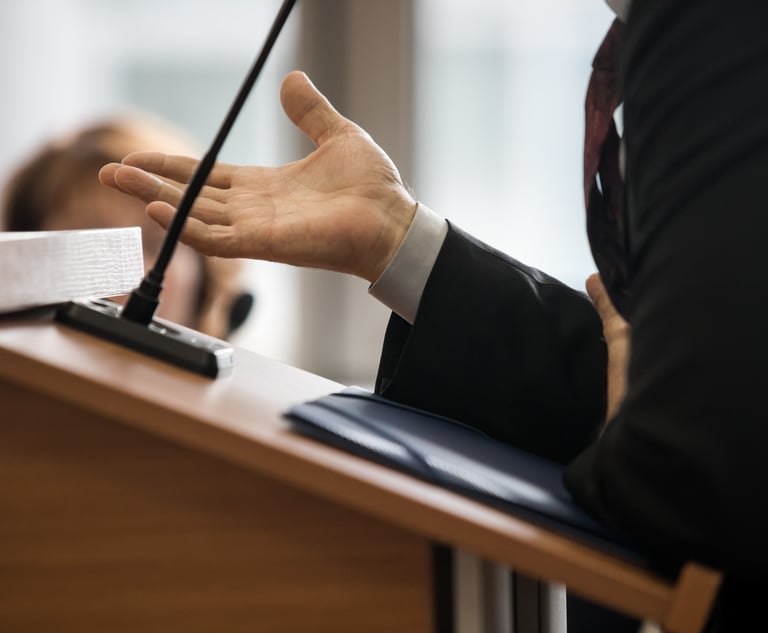 Photo: Shutterstock.com
Photo: Shutterstock.comStudents Petition SCOTUS to Provide Free Legal Tools
The 119 law students, 54 solo and small firm practitioners and 21 legal educators span 69 law schools and 39 U.S. states and territories.
June 12, 2019 at 03:16 PM
7 minute read
The original version of this story was published on National Law Journal
More than 100 law students, from Yale Law School and other schools, along with nearly 100 solo and small-firm practitioners and legal educators, are urging the U.S. Supreme Court to eliminate copyright protection for state annotated codes of law and certain other state and local legal materials.
The case Georgia v. Public.Resource.Org is unusual in that both parties, and all of the friends of the court, including the law students, want the justices to take up and decide the case—but for different reasons. The justices are scheduled to take their first look at the case in their private conference June 13.
At the center of Georgia's petition at the Supreme Court is the “government edicts” doctrine, a judicially created exception to copyright protection for certain works that have the force of law. The doctrine dates to the 1800s and three high court opinions that held that judicial opinions are not copyrightable. The justices have not addressed it since, but it has been applied by lower courts also to exempt statutes from copyright protection.
Georgia, represented by Vinson & Elkins counsel Joshua Johnson in Washington, asked the justices to reverse a decision last year by the U.S. Court of Appeals for the Eleventh Circuit. The appeals court, applying the government edicts doctrine, invalidated the state's copyright in the Official Code of Georgia Annotated. Georgia had sued the nonprofit Public.Resource.Org for alleged infringement after it posted volumes of the annotated code online.
The annotated code contains such materials as summaries of judicial decisions and state attorney general opinions. The code without annotations is free to the public.
Johnson said the plain language and legislative history of the Copyright Act establishes copyright protection for the Georgia code annotations.
Public.Resource.Org, or PRO, whose counsel is Goldstein & Russell partner Eric Citron, said it agrees with the Eleventh Circuit decision. But the group has urged the court to hear the case because the doctrine is difficult to apply “when a work does not fall neatly into a category, like statutes or judicial opinions, already held to be edicts.”
The law students and their fellow amici, represented by Jef Pearlman, director of the Intellectual Property and Technology Law Clinic at the University of Southern California Gould School of Law, contend the appellate court's ruling was correct to give free access to the annotated Georgia state code. They contend, however, the “decision below represents a local solution, but the problem is nationwide and stems from the inconsistent application of the edicts of government doctrine.”
The 119 law students, 54 solo and small firm practitioners and 21 legal educators span 69 law schools and 39 U.S. states and territories. The students who signed onto the amicus brief are affiliated with schools including Harvard Law School; Stanford Law School; University of California, Berkeley; Yale Law School; University of Texas at Austin School of Law; Georgia State University College of Law; Cornell Law School; and Penn State Dickinson Law. A footnote in the brief said: “A small number of legal educator and law student amici contacted counsel directly via email to sign on to the brief.”
There is a line between what should be open and what should be copyrighted, Pearlman said in an interview. “It's often hard to articulate where exactly that line is, which is why we want the Supreme Court to take the case,” he said. “My mental model for the line is: Do you need this to understand the law? Can you comply with the law and practice the law without this information? If you do and you can't, then it has to be free and open to the public.”
For law students who often must study the law of multiple jurisdictions, the task becomes much harder, wrote Pearlman, when each jurisdiction's law is available only through “some favored private entities,” or when the only free version of the law omits “critical information” like Georgia's annotations. Those annotations, the appellate court said, “clearly have authoritative weight in explicating and establishing the meaning and effect of Georgia's laws.”
Solo and small firm lawyers also are at a disadvantage. Unlike big firms, they can't afford substantial subscription costs of large commercial databases that contract with states for creation of annotations and other legal materials.
“The expense is amplified by the possibility that the law necessary to good representation may be spread across multiple, exclusively-licensed databases, forcing attorneys in smaller practices to spread their resources even more thinly,” Pearlman told the justices.
Public.Resource.Org's supporters at the high court also include the R Street Institute, C-SPAN, and American Library Association. Their amicus brief, filed by Charles Dean of the R Street Institute, a public policy research organization, said: “Clarification of the edicts-of-government doctrine is of momentous importance because state-owned copyrights affect the ability of citizens to govern themselves.”
Separately, several organizations that billed themselves as next-generation legal research platforms urged the justices to take the case to eliminate what they described as uncertainty about the scope of the government edicts doctrine and to establish uniform access. The organizations, including Free Law Project, Fastcase, Justia and Casetext, are represented by Phillip Malone of Stanford Law School's property and innovation clinic.
 Mayer Brown's Andrew Pincus, speaking at the 18th Annual Legal Reform Summit, held at the U.S. Chamber of Commerce in Washington, on Wednesday. Photo: Diego M. Radzinschi/ ALM.
Mayer Brown's Andrew Pincus, speaking at the 18th Annual Legal Reform Summit, held at the U.S. Chamber of Commerce in Washington, on Wednesday. Photo: Diego M. Radzinschi/ ALM.
The Software and Information Industry Association, whose counsel is Mayer Brown partner Andrew Pincus, is supporting Georgia.
Pincus's brief said the appellate court created a “wholly new and unpredictable approach to copyright for law-adjacent works of authorship. The resulting uncertainty inevitably will deter investment in the creation of useful law-related works—the exact opposite of the purpose of the copyright law.”
Arkansas and six other states, supporting Georgia, also argued that the Eleventh Circuit was wrong and its reasoning, if it is applied elsewhere, will threaten “copyrights held in the official annotated codes of 21 other States, two territories, and the District of Columbia.”
Arkansas Solicitor general Nicholas Bronni said in his amicus brief that “annotations are not themselves the law, nor authoritative guidance on it.”
Matthew Bender & Co., represented by Troutman Sanders partner Misha Tseytlin, weighs in, telling the justices that 23 states and U.S. territories have contracted with publishers like LexisNexis for the creation of statutory annotations.
“The Eleventh Circuit's decision needlessly destroys a thriving market for the creation of State-owned annotations by private publishers, which benefits the public's understanding of the law and does not impose greater taxpayer funding obligations by the States,” Tseytlin wrote.
This content has been archived. It is available through our partners, LexisNexis® and Bloomberg Law.
To view this content, please continue to their sites.
Not a Lexis Subscriber?
Subscribe Now
Not a Bloomberg Law Subscriber?
Subscribe Now
NOT FOR REPRINT
© 2024 ALM Global, LLC, All Rights Reserved. Request academic re-use from www.copyright.com. All other uses, submit a request to [email protected]. For more information visit Asset & Logo Licensing.
You Might Like
View All
New Teeth for Anti-SLAPP Statute? Absolute Immunity for Union Grievance Proceedings
2 minute read
Judge Reduces Attorneys' Award in Boston Sidewalk Settlement for Repetitive Billing
4 minute read
Pike Fuels Agrees to Pay $2 Million Settlement to Resolve Alleged New Haven Environmental Violations
2 minute read
Decisions Have 'Real-Life Consequences': Juvenile Court Judge Considered for Appellate Bench
Trending Stories
- 1Call for Nominations: Elite Trial Lawyers 2025
- 2Senate Judiciary Dems Release Report on Supreme Court Ethics
- 3Senate Confirms Last 2 of Biden's California Judicial Nominees
- 4Morrison & Foerster Doles Out Year-End and Special Bonuses, Raises Base Compensation for Associates
- 5Tom Girardi to Surrender to Federal Authorities on Jan. 7
Who Got The Work
Michael G. Bongiorno, Andrew Scott Dulberg and Elizabeth E. Driscoll from Wilmer Cutler Pickering Hale and Dorr have stepped in to represent Symbotic Inc., an A.I.-enabled technology platform that focuses on increasing supply chain efficiency, and other defendants in a pending shareholder derivative lawsuit. The case, filed Oct. 2 in Massachusetts District Court by the Brown Law Firm on behalf of Stephen Austen, accuses certain officers and directors of misleading investors in regard to Symbotic's potential for margin growth by failing to disclose that the company was not equipped to timely deploy its systems or manage expenses through project delays. The case, assigned to U.S. District Judge Nathaniel M. Gorton, is 1:24-cv-12522, Austen v. Cohen et al.
Who Got The Work
Edmund Polubinski and Marie Killmond of Davis Polk & Wardwell have entered appearances for data platform software development company MongoDB and other defendants in a pending shareholder derivative lawsuit. The action, filed Oct. 7 in New York Southern District Court by the Brown Law Firm, accuses the company's directors and/or officers of falsely expressing confidence in the company’s restructuring of its sales incentive plan and downplaying the severity of decreases in its upfront commitments. The case is 1:24-cv-07594, Roy v. Ittycheria et al.
Who Got The Work
Amy O. Bruchs and Kurt F. Ellison of Michael Best & Friedrich have entered appearances for Epic Systems Corp. in a pending employment discrimination lawsuit. The suit was filed Sept. 7 in Wisconsin Western District Court by Levine Eisberner LLC and Siri & Glimstad on behalf of a project manager who claims that he was wrongfully terminated after applying for a religious exemption to the defendant's COVID-19 vaccine mandate. The case, assigned to U.S. Magistrate Judge Anita Marie Boor, is 3:24-cv-00630, Secker, Nathan v. Epic Systems Corporation.
Who Got The Work
David X. Sullivan, Thomas J. Finn and Gregory A. Hall from McCarter & English have entered appearances for Sunrun Installation Services in a pending civil rights lawsuit. The complaint was filed Sept. 4 in Connecticut District Court by attorney Robert M. Berke on behalf of former employee George Edward Steins, who was arrested and charged with employing an unregistered home improvement salesperson. The complaint alleges that had Sunrun informed the Connecticut Department of Consumer Protection that the plaintiff's employment had ended in 2017 and that he no longer held Sunrun's home improvement contractor license, he would not have been hit with charges, which were dismissed in May 2024. The case, assigned to U.S. District Judge Jeffrey A. Meyer, is 3:24-cv-01423, Steins v. Sunrun, Inc. et al.
Who Got The Work
Greenberg Traurig shareholder Joshua L. Raskin has entered an appearance for boohoo.com UK Ltd. in a pending patent infringement lawsuit. The suit, filed Sept. 3 in Texas Eastern District Court by Rozier Hardt McDonough on behalf of Alto Dynamics, asserts five patents related to an online shopping platform. The case, assigned to U.S. District Judge Rodney Gilstrap, is 2:24-cv-00719, Alto Dynamics, LLC v. boohoo.com UK Limited.
Featured Firms
Law Offices of Gary Martin Hays & Associates, P.C.
(470) 294-1674
Law Offices of Mark E. Salomone
(857) 444-6468
Smith & Hassler
(713) 739-1250










